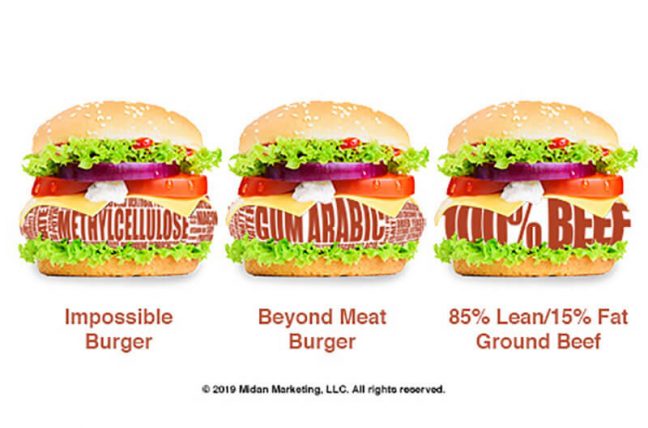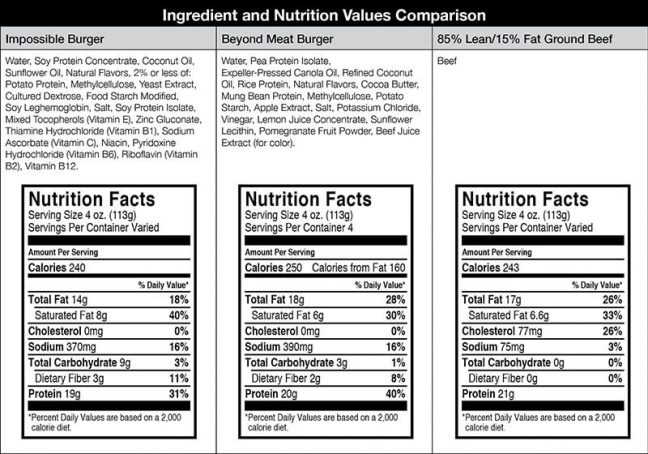by Danette Amstein, principal, Midan Marketing
Not a day goes by that I don’t find the words “plant-based” or “meat alternatives” popping up on my social channels or news feeds. And really, it isn’t surprising. In fact, we measured conversation around plant-based alternatives from 2018-2020 and we’ve seen a 40 percent increase in the last 12 months compared to the prior year.
You see it in ads, read about new product launches and hear your friends talking about trying the latest offerings. While plant-based “meat” isn’t a new idea, the focus on it is and that has led to it becoming a mainstream media darling. I can’t really blame the media—they like to report on what’s new and shiny because that’s what grabs people’s attention.
But is all this hype sustainable?
We are seeing the first signs that perhaps it is not. I have for some time been a proponent of the “there is room in the meat case for both” stance. I am also a strong advocate for consumers understanding exactly what they are getting. This is where informed choice comes in.
Why is this so important? Because according to a recent Midan Marketing study, 49 percent of meat-eating consumers say they would try plant-based alternatives because they perceive them as being “better for me.” This reason far outpaces any other reason.
Learning this has caused me to be bolder with family and friends when the topic comes up. Instead of standing on the sidelines, I am choosing to enter the conversation. I want to know why someone is purchasing a plant-based product. I ask if they have looked at the nutrition facts panel or, better yet, the ingredient list.
Consumers don’t seem to understand that a 4-oz. portion of 85 percent lean/15 percent fat ground beef compared to the same weight of plant-based meat alternatives has very similar amounts of total calories, fat and saturated fat, with less sodium and slightly more protein. And all ground beef options with a higher lean content (i.e., 93 percent lean/7 percent fat) actually outperform plant-based meats for all of these nutrient values.
Visuals often do a better job than words of bringing the biggest differences to light:

And sometimes the data speaks for itself:

Consumers’ reactions to this ingredient and nutrition information may be what is causing the sheen on these new products to dim: Their highly processed nature is at odds with the “healthy” assumption consumers are making. Maybe that is why sales have slowed at Burger King, leading it to reduce the price of the Impossible Whopper. It might be the reason Tim Hortons has discontinued its plant-based offering altogether.
But there might be another reason: the taste factor. All wrapped up in a bun with lots of condiments, it is easy to make a good first impression, but that might not be enough to garner long-term loyalty. The same Midan study that cited the reasons people try plant-based meat also offered this important revelation: 49 percent of consumers are not interested in purchasing plant-based meat because “it won’t taste like meat.”
Regardless, the meat industry must stay diligent. These startup companies have deep venture capitalist pockets that will put their money into marketing in order to lift awareness and sales.
Join me in being bold—make sure your circle of friends and family understands exactly what they are purchasing.


Sales have slowed just due to the typical product cycle. The general public are not nutritionists and neither is the author of this piece. “Beef” is far from a clean ingredient, and I think the typical fast food or conventional grocery customer knows that beef is often not high quality, not necessarily clean, and there are strong feelings that meat is unsustainable. Data clearly shows that these products are winning trial with meat eaters so the author should reexamine her perspectives regarding why there was interest in the first place and why these brands are growing so rapidly. It isn’t the marketing, it is the product that is winning.